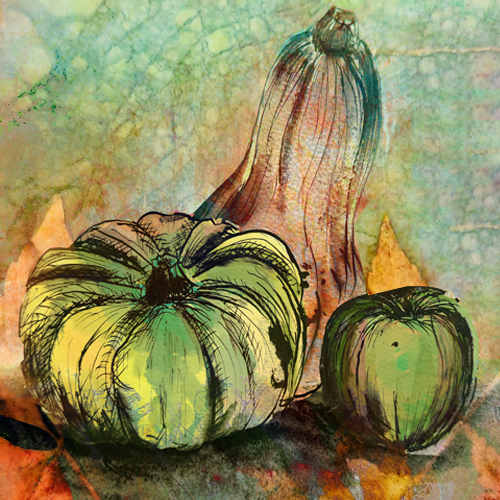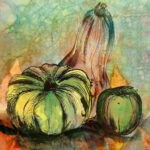Pareidolia
Flash Fiction
by Robert P. Kaye
The cat-shaped condensation of Loretta’s breath curled across a book she’d read before but couldn’t remember, rediscovery one of the joys of old age. The wood stove was out, the power down a week courtesy of a polar vortex, all very sci-fi. She had camped in the cold all her life and who would keep the pipes thawed if she left? She shucked the blanket, donned parka and boots and grabbed the wood basket for the last splinters of the woodpile.
“Freezing to death in your own home smacks of bad planning,” said Sidney, who always spoke when least wanted.
Coming back through the side door, she caught a pant leg on the tusk of driftwood that looked like a mastodon and nearly went down.
“Serve you right breaking a hip on trash you should be burning,” Sidney said.
Burls, driftwood, stones, shells, fossils and flotsam occupied every room of a house otherwise too big for one person. The mementos contained the images of those departed, species gone extinct, places that no longer existed. A record of her life without which she might feel lonely.
“I’ll manage,” she said.
“Parabolia is a degenerative disorder,” Sidney said. “The cure is to face reality.”
”It’s ‘pareidolia’ for chrissakes.” For all his yammering he never said it right. She’d seen wild ponies charging across storm fronts and tiny villages in the moss caps of stumps since she was little. “And it’s a gift, not a disease.”
But Sidney, two years dead — or was it five? — wasn’t listening.
She forced the back door open against a drift, wading through deep snow to the half-dead apple tree that produced a dwindling crop of sour fruit thanks to Sidney’s over-pruning. The nubs of two lopped branches captured his owl-eyed stare, the slash across the bark the same slant as the mustache that made his mouth crooked.
“You were impossible to talk to even when you were alive,” she said.
“You’re arguing with a tree in subzero temperature. I’d say you’ve totally lost it, but you were never entirely there in the first place.”
When they lay out in the tallgrass meadow decades ago he claimed to see the same shapes in the clouds as she did. Sometime after the sex went tepid and the boys left home, he refused to acknowledge that the electrical socket in the attic resembled Hitler, or the center of a wilting rose contained a skull, or even that the great face on Mars was a face.
“I don’t regret my imagination,” she said.
“You’re the same as that pathetic old Japanese man who presented a paper at a paleontology conference claiming the microscopic shapes he saw in limestone inclusions proved people and animals existed in current form since the Silurian, just increased in size by five hundred percent. Seeing things that aren’t there is the definition of feeblemindedness.”
Sidney enjoyed repeating what he found on the internet regarding her ‘disorder.’ He also claimed that vaccines contain mind control chips and celebrities and politicians gather to drink the blood of children to stay young.
“Get yourself to the old folk’s home,” Sidney said. “Where it’s warm.”
Warm did sound good, but she wasn’t giving in yet. “I should saw you up instead,” she said.
“Don’t be absurd,” he said. “You’re too old for that.”
A gust of vortex jangled the icicle daggers on the branches. She retreated inside.
She warmed up by taking the maul ax to the sideboard that once belonged to her mother-in-law, who always complained about Loretta’s housekeeping for Sidney, who never lifted a finger at home. The oak burned steady. She spent the afternoon baking crescent rolls, the house fragrant with yeast.
Around dusk, she snowshoed a mile down the road with a basket of rolls to check on the young couple that Sidney claimed ruined the neighborhood. Janice said the rolls looked like dolphins, Hannah saw humpback whales. They invited Loretta for soup, hot toddies and Monopoly. She snowshoed home tipsy under the rabbit in the full moon, no headlamp required.
Next morning, short of furniture she detested, Loretta amputated dead limbs from the apple tree with the pole saw. She continued cutting and splitting well after the power came back, the exercise better than a health club. The section of trunk with Sidney’s mug provided a good little side table for her tea. When Sidney told her she was being pathetic, she nodded at the wood stove and he changed the subject.

About the Author
Robert P. Kaye’s stories have appeared (or will) in Best Small Fictions 2024, New Letters, Prime Number, Lady Churchill’s Rosebud Wristlet, SmokeLong Quarterly and elsewhere, with details at www.robertpkaye.com. He is an editor at Pacifica Literary Review.
About the Artist
A multi-disciplinary creative, Mark Holman’s practice initially focused on figurative subjects – both sculpted and drawn. Recently, his process has drawn on parallel creative ventures as an actor, musician and horticulturalist, evolving beyond the purely figurative to focus on human connections with nature in a more socially engaged way. The goal of Mark’s current projects is to engage community and encourage discourse, supporting sustainability and promoting healthier relationships with the environment.


